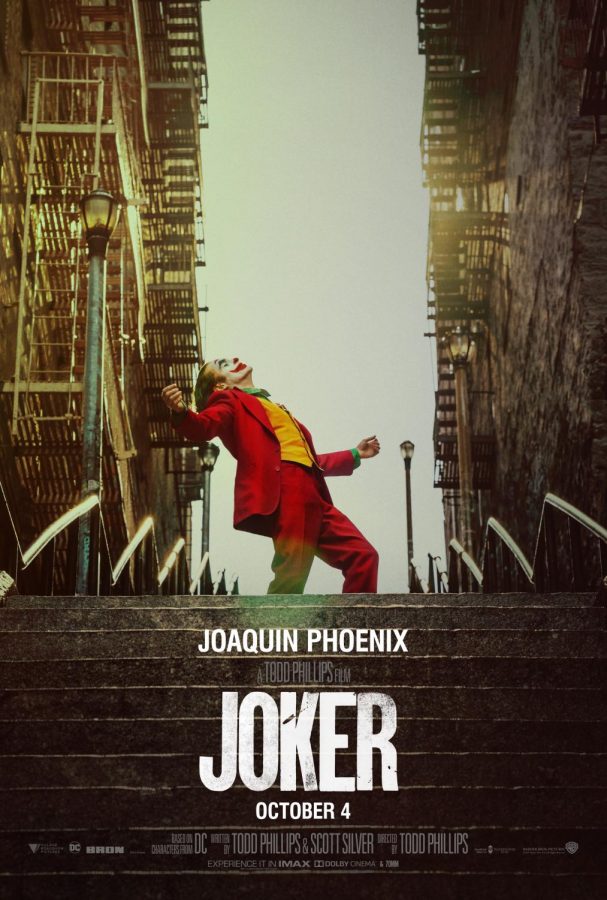Review: “Joker” is all style, no substance
November 2, 2019
“Joker” is a dark and visceral take on the superhero genre which, while anchored by its lead star Joaquin Phoenix’s mesmerizing performance, is thematically pointless.
Set in a realistic incarnation of Gotham in the 1980s, the film is a character study on Arthur Fleck, played by Phoenix, and his bleak but unsurprising descent into madness as his titular alter ego. Fleck is a wannabe clown-for-hire who lives with his ailing mother Penny, played by Frances Conroy, in their simple apartment. Reminiscent of Travis Bickle from “Taxi Driver”, he is bullied at every turn by the unforgiving world around him until he is driven to murder while riding the subway one night. While his identity wasn’t revealed, his first act of violence sparks an underground movement against the likes of billionaire and mayoral candidate Thomas Wayne, played by Brett Cullen. Fleck starts to bask in his cult status as a vigilante while he slowly turns into a narcissistic man bent on violence.
Perhaps since the late Heath Ledger put his own award-winning spin on Joker 11 years ago, Phoenix is jaw-droppingly entertaining as the film’s main character. He commands the audience’s utmost attention with his painstaking commitment to the vulnerable yet unsympathetic character, from his disconcertingly skinny physique to his graceful dancing especially in the aftermath of his violent acts.
Director Todd Phillips, maker of comedies such as “The Hangover” trilogy and “War Dogs,” makes sense of the rich and bleak atmosphere of Gotham, seen through frequent collaborator Lawrence Sher’s absorbing cinematography. The film is also anchored by an ever-present, haunting score from TV miniseries “Chernobyl” alum Hildur Guðnadóttir.
“Joker” pays homage to the psychological thrillers of the 1970s, from Martin Scorsese’s films of the period to “Network” and its jarring final scene. One subplot concerns Fleck’s obsession for talk show host Murray Franklin, played by Robert de Niro, regarding his ill-fated ambition as a stand-up comedian. The casting of De Niro is a clever move, since this particular subplot is exactly the premise of Scorsese film “The King of Comedy” from 1983. In that film, De Niro is in Fleck’s shoes as an aspiring stand-up comedian having a bizarre fixation for a talk show host. In “Joker”, it is now de Niro’s character’s turn to feed on Fleck’s obsessions with fame, in what may be the most on-the-nose full circle moment in cinema since the scene from “The Expendables 2” where Arnold Schwarzenegger and Bruce Willis’s characters trade famous one liners from their own respective action heroes The Terminator and John McClane.
While “Joker” succeeds in style, it falters on substance. Although there is no denying its capacity for shock value, no one should expect to watch “Joker” and come out debating about its storytelling quality for years. Fleck’s motivations for becoming Joker feel shallow and lacking in depth. They dangerously provide a stereotypical, cliché-ridden take on mental illness giving way to Fleck’s “negative thoughts” as he puts it. The film also meanders in terms of which direction the Joker’s newfound tendency for evil is aimed at. Is it against the Waynes and the bourgeoisie? Is it against the media for choosing profit over quality? Is it simply against the meanness of the unforgiving world?
Ultimately, there is nothing serious about “Joker”, so why bother nitpicking on its oversimplified remnants of a theme? At best, it is a poor, muddled attempt on “conveying emotional, psychological experiences” in a superhero movie, echoing Scorsese’s recent controversial comments on the Marvel Cinematic Universe. But one doesn’t need to bother with the shallow depths of “Joker”. It is meant to be a stylistic equivalent of a temporary fix: while it is certainly entertaining, the effects wear off the next day.









